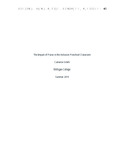| dc.description.abstract | The purpose of this study is to examine the effects of praise in the inclusion preschool classroom as it pertains to students with and without identified disabilities. Praise and extrinsic/intrinsic incentives can have an immense effect on behavior management, and can create a positive learning environment for all in the classroom. The data in this study was comprised from observations in one rural Southwest Virginia inclusion preschool classroom. Daily behaviors, activities, and incentives were documented, as well as the amount of times students with and without disabilities were praised throughout the daily circle time instructional period. Results suggested that praise positively impacted the overall behavior of the classroom, and that students with disabilities were often praised more than those without, however this did not negatively impact students without disabilities. Students from both groups responded similarly to praise, intrinsic motivation, and extrinsic motivation. Students are more likely to present with good behavior in the classroom when they are praised for things throughout lessons. When teachers are properly trained on how to use these techniques along with behavior management, the classroom environment will benefit. | en_US |

